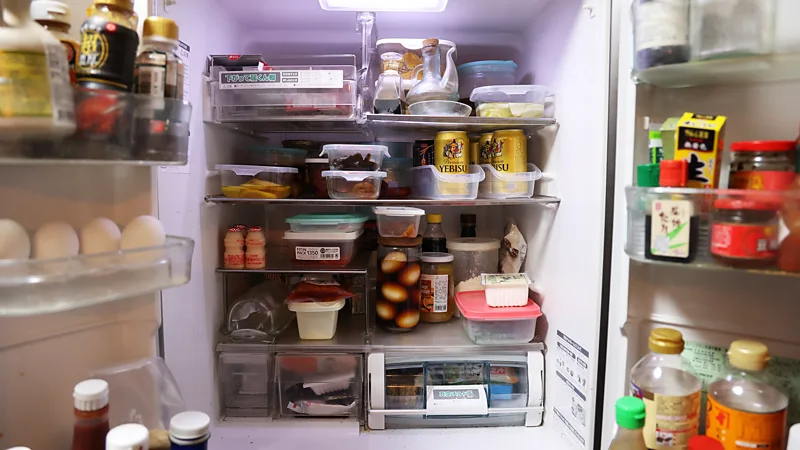The simple Japanese method for a tidier and less wasteful fridge
To help people clear cluttered fridges and reduce food waste, researchers in Tokyo are testing simple organisational techniques – and all you need to get started is some tape and a few stickers.

Have you ever opened your refrigerator and felt a surge of anxiety? Perhaps you struggled to find anything to actually eat amid an excessive jumble of jams, pickles, spreads and half-empty condiments. Or you found yourself befuddled by which of the foil-wrapped remains of bygone meals you should prioritise eating first. Maybe you've even peeked inside a long-forgotten container with contents so foul that you simply threw the entire thing into the garbage.
If any of this sounds familiar, you are not alone. "Quite often, the reason food goes bad and gets wasted is because you forget about it in the fridge and find it rotten later," says Kohei Watanabe, a waste management researcher at Teikyo University in Tokyo.
Household food loss is a global problem of staggering proportions. In the UK, about 60% of all food waste comes from homes, and in the US, 40-50% does. The statistics are similar in Japan. In 2021, around 47% of the country's 5.2 million tonnes of edible food waste originated from private kitchens.
The reasons for all this at-home waste vary, but there are some common culprits across cultures and geographies. These include food getting "lost" inside people's fridges; consumers misinterpreting the meaning of food date labels; impulse buying and poor planning during supermarket visits; and a general lack of awareness about the need to reduce food loss.
Virtually all countries are aware of these problems and many are trying to address them. But Japan faces even greater pressure to find solutions because it imports nearly two-thirds of its food. This amplifies the economic and environmental costs of throwing edible products away. "Japan is a country that is not at all self-sufficient in its food supply," says Tomoko Okayama, a waste management researcher at Taisho University in Tokyo. "It's not a good idea to import more food than we need and then throw a lot of it away."
As two of Japan's leading food waste researchers, Okayama and Watanabe explore the underlying drivers of why edible food winds up in the bin, and then try to use those findings to devise evidence-informed interventions. Their latest project applies fridge-tidying techniques to tackle one of the main sources of loss: the dreaded cluttered fridge. As Okayama says, "If we can help people manage their fridges, we can stop them from forgetting about the existence of the food inside."
From fridge to waste bin
In 2018, Okayama conducted a survey of more than 500 Tokyo residents to explore why they discarded food. Predictably, respondents often assumed fresh produce had gone bad, or that processed foods would no longer taste pleasant. Sometimes, it was simply forgotten. However, she also identified an important source of confusion that leads to waste: many people threw out food at the "best-by" date (also known as "best-before").
"Best-by" and "use-by" dates are not the same thing, however – and neither necessarily means that a product is no longer good, especially in the case of fermented foods, Watanabe says. "Foods do go bad eventually and will be unsafe to eat, so we should make sure we consume them before that," he says. "But some items like fermented food taste better with maturity."
In Japan and a number of other countries, "best-by" refers to the date before which a product is at its peak deliciousness, while "use-by" indicates the date that the manufacturer guarantees for safe consumption. Consumers around the world tend to conflate these dates, though.
Even if a food has exceeded its use-by date, Watanabe points out that manufacturers are conservative in their estimates. Rather than just throwing things out solely based on their "best-before" or "best-by" label, he suggests that people use their senses – literally – for certain low-risk items like condiments, produce, baked goods and fermented foods like yogurt and cheese. "Smell it, look at it," he says. "Most things are good for quite a long period after the expiry."
The importance of noticing
Hoping to reduce this waste, Okayama and Watanabe figured that a multi-pronged strategy of community education and practical fridge-tidying techniques could help.
FRIDGE TIPS
How to reduce waste
- - Create a shelf or section for soon-to-expire food, or use tape/stickers to label it.
- - Make this food visible with a transparent tray or container, rather than shoving them to the back.
- - Check 'best-by' (or best-before) dates – they're different to 'use-by' – and the food may be edible.
- - If you need to discard food, do so mindfully. To encourage this, researchers in Toyko even advised adding stickers with a message apologising to the food for not eating it (see main story).
To test their approach, they found willing government partners in Arakawa, a neighbourhood in northern Tokyo that was already invested in reducing food waste. Since 2008, Arakawa's Environment and Cleaning Department had been promoting a project called "Operation Arakawa Mottainai" – a common Japanese phrase that expresses regret over waste. They had tried lots of behaviour-change strategies over the years, but the effectiveness had been hard to measure, says Yukiko Miyazaki, a head officer at the department.
The team settled on two apartment complexes in Arakawa, one for the experimental intervention and the other a control. First, Watanabe and Okayama spent several days sorting through about a tonne of waste from the apartments. They separated, weighed and recorded all the food it contained.
They found globs of leftovers mixed in with whole fruits and vegetables and entire unopened packages of noodles, breads, snacks, meats, sauces, tofu, fish, beverages and rice balls. Fancy boxes of untouched or barely-eaten cookies, chocolates and other sweets were another common item and suggested, Okayama says, that these things had been "given as gifts, but nobody wanted them". The team also made a special note of the high number of fermented foods they discovered, especially yoghurt, which shows a misunderstanding about spoilage, Watanabe says. "Fermented foods are still alive, so they don't go bad that easily.
Next, Okayama and Watanabe held volunteer meetings with residents in an apartment complex called Sky Heights, to tell them about the project. They gave a short lecture about food waste, spoke about best-by dates, and introduced a suite of "nudge" interventions: methods intended to subtly steer people towards positive behavioural choices without a huge commitment.
These nudges included techniques for smarter fridge organisation – which anyone could try if they want to reduce waste.
How to organise a fridge
For starters, Watanabe and Okayama gave residents bright red-and-white-striped tape. This was to mark off a section of their fridges reserved for quickly expiring items, or to stick directly onto need-to-eat products to bring attention to them. They also distributed clear, open-topped plastic trays meant to make imminently spoiling foods more visible and easily accessible.
The researchers also gave out stickers that depicted two people with their hands clasped together beneath the message "I cannot eat you. I'm so sorry." They encouraged participants to put one of these stickers on every food item they threw away and to take a moment to internalise the sticker's message. As Okayama says, "I think noticing is very important."
Two weeks after their meeting with the Sky Heights residents, the researchers conducted another waste-sorting analysis. The results were encouraging: they found a 10% reduction in food waste in the experimental area, and a 10% increase in food waste in the control area. Putting these findings together, Watanabe interprets them as meaning that the intervention in fact delivered a 20% reduction in food waste. (He and Okayama suspect that the increase in the control area could partly be explained by it being December, which is hot pot season – a dish that almost inevitably generates waste.)
In follow-up surveys with Sky Heights participants, 77% said they used the plastic tray, 18% used the stickers and 13% used the tape. Simply talking about food waste and bringing it to the forefront of people's minds also seems to have been a significant factor for change. In a March meeting where Watanabe and Okayama presented their results to 14 Sky Heights residents, Noriko Nozaki, a 78-year-old in attendance, said that the campaign made her aware of "things you don't normally think about".
Although she wound up using her plastic tray to store cans of Yebisu beer rather than quickly-expiring items, she said she's now better able to connect food waste from her kitchen to larger world problems, like climate change and resource scarcity. "Just having a small thing in your mind can have a great effect on reducing waste," she said.
Hiroko Sasaki, an 82-year-old whose post-war upbringing instilled in her a lifelong commitment to never waste food, added that she felt "quite angry" seeing the photos of all the edible products that Watanabe and Okayama fished out of the apartment complex's garbage. "But just feeling angry won't solve the problem, so it's good to talk about the issue and encourage others to do more," she said.
Watanabe and Okayama do not know the extent to which their findings in Arakawa can be applied elsewhere in Japan or beyond. But they are conducting a follow-up experiment that replicates the study in 520 households in Nagai, a city in Yamagata prefecture. This could give local governments around Japan more encouragement to try similar programmes in their communities. "It doesn't cost too much to do," Watanabe says. "If the local authority likes the idea, they can pretty easily scale it up."
Miyazaki and her colleagues are already thinking ahead about ways they can reach more Arakawa residents, including by holding information campaigns and teaching children about food loss. "Our challenge is how to get as many households to put the 'nudge' measures into practice," she says. "We would like to help foster a mottainai spirit."
People don't need to wait for government representatives to step in, though. Anyone could use plastic trays, tape and stickers, no matter where they live in the world. They could also question more when a food item should actually be discarded, Okayama says. "Throwing food away just because it has passed its best before date is a waste of resources – and also your money."
-bbc







